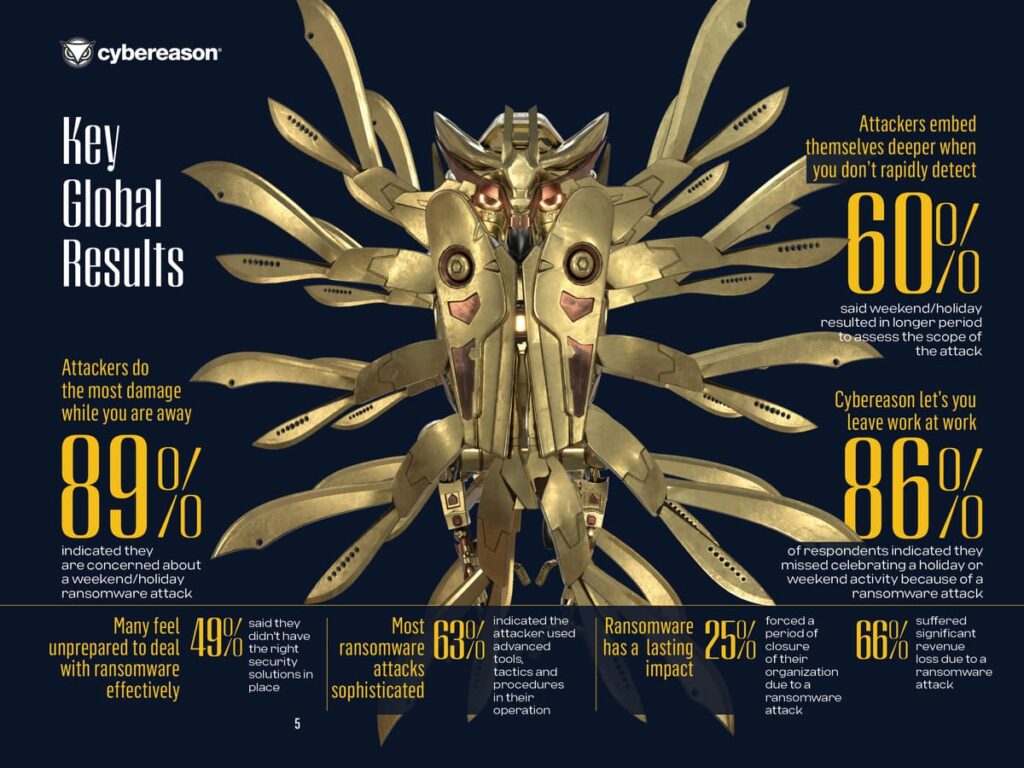Christmas and the festive season are here at last! For all of us, it’s a magical time of joy, sharing and relaxation. But in the digital world, the situation is quite different. You may not be aware of it, but cybercriminals redouble their activity during this period. Indeed, they never take a break, and ransomware attacks, in particular, seem to multiply during these festive times. Why, you ask? The reason is simple: companies lower their guard. With fewer staff and less oversight, it’s the perfect time for attackers to strike. And the figures are there to prove it. A recent study by Cyberseason in 2022 showed an alarming increase in ransomware attacks over weekends, public holidays and periods like Christmas, revealing a vulnerability often overlooked by businesses.
Table des matières
ToggleAnalysis of ransomware attacks during the vacations
The vacations, synonymous with rest for most, have unfortunately become a propitious time for ransomware attacks. Statistics show an alarming increase in these attacks during vacations, weekends and public holidays, taking advantage of reduced security staff and the absence of decision-makers. A real treat for cyberattackers who choose these times, knowing full well that defenses are weakened. Ransomware attacks continue unabated.
Lack of preparedness for ransomware attacks over weekends and public holidays has significant consequences for the organizations affected. Data fromCyberseaon’s 2022 study reveals that :

- 60% of those surveyed reported that it took them longer to assess the scale of an attack.
- 50% said they needed more time to organize an effective response.
- 33% said they needed more time for full recovery after an attack.
- 12% said their company had suffered revenue losses as a direct result of the attacks.
- 66% have suffered significant revenue losses due to a ransomware attack.
- 25% were forced to close their organization as a result of a ransomware attack.
These results confirm the hypothesis that ransomware attacks perpetrated during non-working days or holiday periods are more difficult to assess, mitigate, remediate and overcome.
It is therefore essential for businesses to be aware of this increased risk and to take proactive measures to secure their networks and data, even outside normal business hours. This underlines the need for constant vigilance and adequate preparation in the face of these threats.
Vulnerabilities specific to holiday periods
Going on vacation without securing your IT system is a bit like leaving your house open and unattended. The reduction in security personnel over weekends and holidays creates an ideal playground for attackers. Monitoring and incident response systems are often less active, offering cybercriminals the perfect opportunity to infiltrate networks and deploy their ransomware. This vulnerability highlights the importance of having an incident response plan that remains operational 24/7, even during periods of low activity.
Reduced or even absent staff during such periods can lead to delays in detecting and responding to attacks, allowing ransomware to cause greater damage. Companies are therefore strongly advised to plan their security strategy for these vulnerable periods.
What are the financial and operational consequences of a holiday ransomware attack?
The impact? Enormous. It’s a nightmare for any business. Ransomware attacks can have devastating financial and operational repercussions, all the more so if the attack was detected too late due to lack of active monitoring and was able to propagate deep into the system. Recovery costs, lost revenues due to business interruptions, and reputational damage can jeopardize a company’s long-term viability.
Too often forgotten are the hidden costs: disruption to operations, loss of customer confidence, and reputational damage. All these recovery costs after a ransomware attack can be astronomical, not to mention the long-term operational impact.
The FBI was already warning businesses in 2021 about this particular vulnerability to vacation and shutdown periods. It is therefore imperative to implement effective data backup and recovery strategies, as well as rigorous security policies to minimize these risks.
The pressure on IT security teams is immense, especially during these periods of heightened vulnerability. The risk of burnout and the shortage of talent in this sector are additional challenges that companies must take into account to maintain an effective defense against these threats.
Increased impact on security teams
Ransomware attacks take a heavy toll on IT security teams, especially when responses have to be made in absolute urgency and without any prior recovery plan. These relentless attacks, especially during non-work periods, put immense pressure on these teams.
It is therefore essential that companies recognize and support their security teams, providing them with the resources and support they need to effectively combat these threats. This includes creating a strong security culture within the company.
Implementing preventive measures and contingency plans
So, what needs to be done? Companies absolutely must have emergency plans in place. They need to be ready to react quickly, even outside normal working hours.
It’s vital to develop incident response protocols, set up incident detection and response systems, and carry out regular tests and simulation exercises to assess the effectiveness of their plans.
The use of advanced technologies to detect and protect against ransomware is essential. Solutions such as next-generation antivirus, firewalls and intrusion detection systems play a significant role in preventing these attacks. Companies must also ensure that their systems and software are regularly updated to protect against the latest threats.
What strategies should be employed to strengthen security against ransomware attacks?
Companies need to adopt a proactive, collaborative approach to strengthening their security. This can include sharing threat information with other organizations, investing in the research and development of innovative security solutions, and implementing strict access control and identity management policies.
And don’t forget training! A well-informed and vigilant team is your best defense. By educating employees about the signs of an attempted attack and best practices for protecting themselves, companies can strengthen their first line of defense against these threats.
So be vigilant, even during this festive season!
